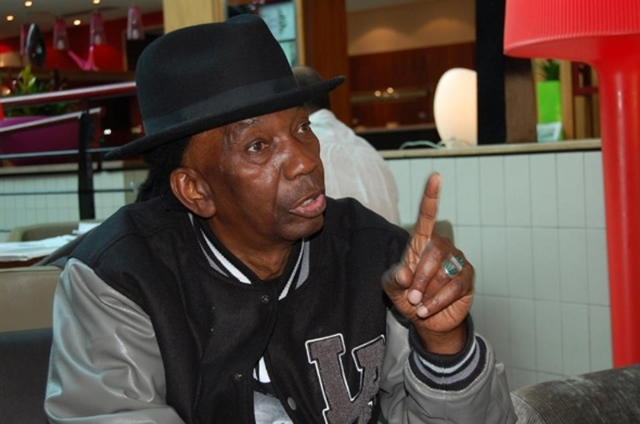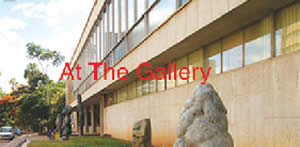A man of many colours

Fred Zindi Own Correspondent—
“Thomas’ (Mapfumo) career was certainly compromised, if not ruined, by his move to America,” notes Banning Eyre in his new book on the musician titled “Lion Songs: Thomas Mapfumo and The Music That Made Zimbabwe”. The 416-page book, with 62 illustrations, was published by Duke University Press and is a comprehensive chronicle of the life story of the Chimurenga guru, Thomas Mapfumo.
There is something especially daunting about preparing a feature on a music book. There is so much ground to cover in terms of time, space and format. So the idea of claiming to cover everything that is written in the 416-page book seems ridiculous. So this is not that sort of review and this is not a definitive be-all-end-all review as much as a starting point.
This is not the first time a book has been written about Thomas Mapfumo or on his works. There are other worthy titles like Aleck Pongweni’s 1982 “Songs that Won The Liberation War” and even Fred Zindi’s 1985 “Roots Rocking in Zimbabwe”.
Banning Eyre is a freelance writer and guitarist and the senior editor and producer of the public radio programme “Afropop Worldwide”. He is the author of “In Griot Time: An American Guitarist in Mali”, “Playing With Fire: Fear and Self-Censorship in Zimbabwean Music” and “Guitar Atlas: Africa” and the co-author of “Afropop: An Illustrated Guide to Contemporary African Music” and other publications.
He has also performed and recorded with Thomas Mapfumo. “Lion Songs” is not just a biography, it testifies to the way music can unlock the secrets of history, society and the human spirit. Zimbabwe’s story is by turns inspiring and heartbreaking. Mapfumo’s life and art, so elegantly told here, can be felt and understood in this book as never before.
In this 2015 publication, Thomas Mapfumo, the Lion of Zimbabwe, stands beside FelaKuti, YoussouN’Dour and Franco as one of Africa’s greatest and most consequential composer/bandleaders. For over 40 years, he has merged ancient African traditions — especially that of the sacred, metal-pronged Shona mbira — into the currents of international music, from rock to reggae to rap.
The book also outlines that Mapfumo rose to prominence in Rhodesia during the war of liberation from white oppression of the black masses. The music identified with the political climate of the time. Thomas championed the plight of the rural masses by singing protest songs which criticised the Smith regime.
“Hokoyo” released by Teal Record Company in 1977 sent shock waves throughout the country, while “Pfumvu Paruzeva” released the following year depicted the deplorable plight of the rural people who were facing the cruel hands of white soldiers at a time when freedom fighters were in battle with Ian Smith’s soldiers all over Zimbabwe.
As a result of these releases, his music was banned from airplay by the Smith regime and he was arrested and jailed without trial. After his release, the next album was less political and it received significant airplay. With the advent of independence in 1980, Thomas Mapfumo received official recognition when he was asked to perform at a ZANU-PF rally in front of Zimbabwe’s President Mugabe just before he became the country’s first Prime Minister.
This was followed by the release of “Congress”, a song which was written in anticipation of ZANU-PF’s first annual congress. After Independence, Mapfumo was beginning to enjoy recognition from the new black government led by Prime Minister Mugabe.
Previously, the Smith regime authorities had declared Mapfumo’s music as subversive. They had banned it from air-play, asked Teal Record Company to stop releasing any more of his music and Mapfumo had been subsequently locked up at Chikurubi for 90 days.
However, Teal Record Company, a white-owned organisation, managed at the time by Tony Rivett and John Grant, were equally defiant and continued to release Mapfumo’s music as he had become their cash cow. When he came out of prison, Teal released more singles as Thomas had proved to be a money spinner for them. After several “Chimurenga” singles, the album “Hondo” was released next.
Between 1990 and 2001, Thomas Mapfumo released five albums which included “Chimurenga Hits Volume 1 and 2”, “Chimurenga Explosion” and “Chimurenga Rebel”.
In the year 2000, the “Chimurenga Explosion” album became an instant hit especially with the singles “Mamvemve” and “Disaster”. There is no questioning about the ambition of this biography of Thomas Mapfumo, a musical figure who might well be to Zimbabwe what Bob Marley was to Jamaica.
Eyre is certainly well qualified to write about Thomas although it is reported that there was a dispute between the two regarding the book’s content. As a guitarist who has long known his subject (and performed with him) and as a journalist, radio producer (PRI’s Afropop Worldwide) and musicologist he certainly is the man who can contribute significantly to the life story of the icon.
The author asserts from the outset that “in the end, there is no way to understand Thomas Mapfumo without understanding Zimbabwe and no better way to know Zimbabwe than through an examination of the life and work of Thomas Mapfumo”. Yet both the complex, contradictory artiste and his country, the former Rhodesia, defy easy understanding.
His musical accomplishment has been controversial from the start, as he appropriated spiritual music and brought it into the secular marketplace, updated it with electric guitars and added non-native elements such as reggae and rhumba and had contentious business dealings with practically every musician and most managers with whom he has worked.
Mapfumo’s “music has never riveted the larger world the way Bob Marley’s reggae or Fela Kuti’s Afrobeat have. Many of those closest to Thomas and his story are left with the nagging sense that he could have, should have, counted more.”
Eyre is plainly one of them and this biography is the result, though it gives ample space to those questioning Mapfumo’s originality, politics, business dealings and decision to leave Zimbabwe for Oregon almost two decades ago.
An essential book for those who love the artiste’s music and want to know more, but it won’t likely win converts as an introduction.
Feedback: [email protected]










Comments